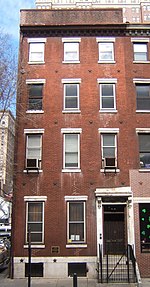Philadelphia Club
1834 establishments in PennsylvaniaBuildings and structures in PhiladelphiaClubs and societies in PhiladelphiaGentlemen's clubs in the United StatesHistory of Philadelphia ... and 4 more
Organizations based in PhiladelphiaOrganizations established in 1834Philadelphia ClubPhiladelphia Register of Historic Places

Philadelphia Club was founded in 1834 and is located at 13th and Walnut Streets in Center City, Philadelphia. It is the oldest city club in the United States and one of the oldest gentlemen's clubs. Notable members have included George Meade, Owen Wister, and many members of the Du Pont and Biddle families.
Excerpt from the Wikipedia article Philadelphia Club (License: CC BY-SA 3.0, Authors, Images).Philadelphia Club
South 13th Street, Philadelphia Center City
Geographical coordinates (GPS) Address Nearby Places Show on map
Geographical coordinates (GPS)
| Latitude | Longitude |
|---|---|
| N 39.949 ° | E -75.162 ° |
Address
Walnut Square Apartments
South 13th Street 201
19107 Philadelphia, Center City
Pennsylvania, United States
Open on Google Maps






